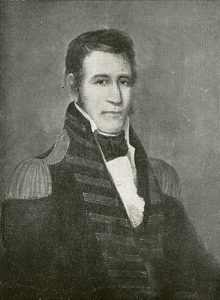At the University Day celebration on October 11, 2016, Chancellor Carol Folt announced a new program to name scholarships after notable “firsts” in UNC history. In recognition of the individuals recognized as pioneers at UNC, the University Archives is publishing blog posts with more information about each of the twenty-one “firsts.” This post is part of that series.
Captain Johnston Blakeley (sometimes spelled Blakely) was a successful naval officer during the War of 1812 and the first University of North Carolina alumnus to give his life in military service to the United States.
Blakeley had a long journey to Chapel Hill. Born in County Down, Ireland in 1781, he immigrated to the United States with his family in 1783. Tragically, his mother died during the voyage. His family lived in Wilmington, NC, but he spent much of his youth in school in Flatbush, Long Island, NY.
In 1796 he entered UNC (making him a contemporary of Hinton James) and was a member of the Philanthropic Society by 1797. The first speech he gave to the society “spoke on the happiness of ye farmers.” His later speeches and compositions covered a variety of topics: the education of women, Jacobinism, the advantages of education, self-government, the state of France and America, Brutus’ speech to the Romans, advantages of riches and poverty, and tobacco. He even gave a reading of Ulysses’ speech to Alcinous and the queen from The Odyssey.



In January of 1815 his wife, Jane Hoope Blakeley, gave birth to a daughter, Udney Maria. The following year the North Carolina legislature resolved to pay for Udney’s education and to provide the family with funds. The legislature planned to give Udney a sword in memory of her father, but in the end, at her mother’s suggestion, she was given a silver tea service. In 1904, the US Navy honored Blakeley with the naming of a battleship, the USS Blakely.
A poem written by a “highly gifted and accomplished young lady” demonstrates the power of Blakeley’s legacy:
No more shall Blakeley’s thunder roar
Upon the stormy deep;
Far distant from Columbia’s shore
His tombless ruins sleep;
But long Columbia’s song shall tell
How Blakeley fought, how Blakeley fell.
Sources:
Homans, Benjamin. Army and Navy Chronicle. Vol. 6, 1838.
“Johnston Blakeley, 1781-1814.” North Carolina Portrait Index, 1700-1860. Chapel Hill: UNC Press. p. 25.
“Minutes, 1795-1959.” in the Philanthropic Society of the University of North Carolina Records, 1795-1959 #40166, University Archives, Wilson Library, University of North Carolina at Chapel Hill
A. R. Newsome, “Udney Maria Blakeley,” North Carolina Historical Review 4 (1927).
